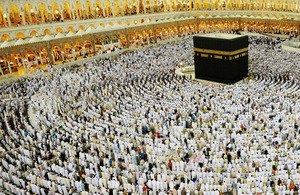Update on Hajj travel advice for pilgrims
Check the latest health advice before travelling, in the light of the on-going cases of Middle East respiratory syndrome coronavirus (MERS-CoV).

Hajj pilgrimage
Public Health England (PHE) and National Travel Health Network and Centre (NaTHNaC) are reminding people planning to travel to Saudi Arabia for the annual Hajj pilgrimage to check the latest health advice before making the journey as further advice has been issued in the light of the on-going cases of Middle-East Respiratory Syndrome coronavirus (MERS-CoV).
The Hajj is the largest annual international gathering with more than three million Muslims travelling from around the world to make the pilgrimage including thousands from the UK. This year Hajj is estimated to fall between 13 and 15 October 2013.
Although the World Health Organization does not currently advise any travel restrictions to the Kingdom of Saudi Arabia in relation to MERS-CoV, in addition to the usual health recommendations that are required for pilgrims, the Ministry of Health in Saudi Arabia has recommended that the following groups postpone the performance of the Hajj and Umrah this year for their own safety:
- the elderly (over 65 years of age)
- those with chronic diseases (such as heart, kidney or respiratory disease, diabetes), immune deficiency, cancer and terminal illnesses)
- pregnant women and children under 12 years of age
Dr Brian McCloskey, director of global health at PHE, said
A large population from around the world confined to one area has historically increased the risk of infectious disease outbreaks, in particular meningitis and respiratory infections, which is why getting the relevant travel advice and vaccinations in advance of your departure is so important.
Dr Dipti Patel, joint director of NaTHNaC, said:
Although there have only been a relatively small number of confirmed MERS-CoV cases worldwide, the Saudi Arabian Ministry of Health has advised vulnerable people and children who may have been planning to travel to the Middle East to perform the Hajj or Umrah to postpone their pilgrimage.
Other people should continue with their plans but follow the specific guidance on the Hajj and Umrah, and other general advice about staying safe and healthy when travelling.
Notes
-
There are no travel restrictions to the Middle East and the risk to travellers remains very low. There is no change to (other) travel advice.
-
For the latest travel advice, please see the NaTHNaC website.
-
General travel health advice for travellers to Saudi Arabia.
-
Middle East respiratory syndrome coronavirus (MERS-CoV) is the recommended name for what was previously called novel coronavirus.
-
For more information about MERS-CoV please visit PHE’s dedicated webpages.